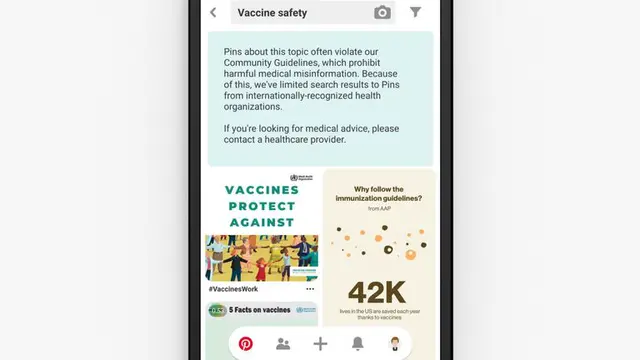Pinterest users searching for help and advice about vaccines will be directed to public health bodies as part of the social media site's attempt to tackle the spread of misinformation.
The platform, which is built on the idea of people sharing images associated with different topics to foster dedicated communities around them, has rolled out the feature on its website and mobile apps.
It means that when people search for terms such as "measles" or "vaccine safety", they will be shown results from the likes of the World Health Organisation (WHO) and the Centres For Disease Control (CDC).
Image:The information will be provided by several recognised health bodies. Pic: Pinterest
"Last year, we made the decision to stop showing results for searches related to vaccines as a way to prevent people from encountering harmful health misinformation," said a Pinterest blog post.
"This new search experience only shows content from leading public health institutions - you won't see any recommendations or comments on Pins in these results. We also won't show ads."
The post added: "We're taking this approach because we believe that showing vaccine misinformation alongside resources from public health experts isn't responsible.
"As we continue to tackle health misinformation, we remove it and the accounts that spread it from our service. But we also want to bring expert content onto Pinterest."
The timing of the announcement coincides with new WHO figures that show Europe saw around 90,000 cases of measles in the first half of 2019 - more than in the whole of last year (84,462).
According to the WHO, the surge in measles cases was partly due to disinformation about vaccines circulating on social media, which it said was just as contagious and dangerous as the diseases it helps to spread.
The US is also facing its worst measles outbreak in nearly three decades.
Image:Researchers say disinformation about vaccines has been spread online by Russian trolls and bots
In a statement, the WHO said: "Social media platforms are the way many people get their information and they will likely be major sources of information for the next generations of parents.
"We see this as a critical issue and one that needs our collective effort to protect people's health and lives."
As well as the WHO and the CDC, Pinterest will also feature results from the American Academy of Paediatrics (AAP), and the WHO-established Vaccine Safety Net (VSN) when they search for a related term.
Other social media platforms have also stressed a commitment to tackling misinformation about vaccinations, which researchers have said is being spread by Russian trolls and bots.
Facebook said in March it would "take action" against vaccine hoaxes identified by the WHO and CDC, such as by removing pages and groups that spread them from recommendations and rejecting any offending adverts.
On Twitter, searches about vaccines in the US will prompt users to visit vaccines.org, which is run by the government department for public health.
(SKY NEWS)
 简体中文
简体中文

